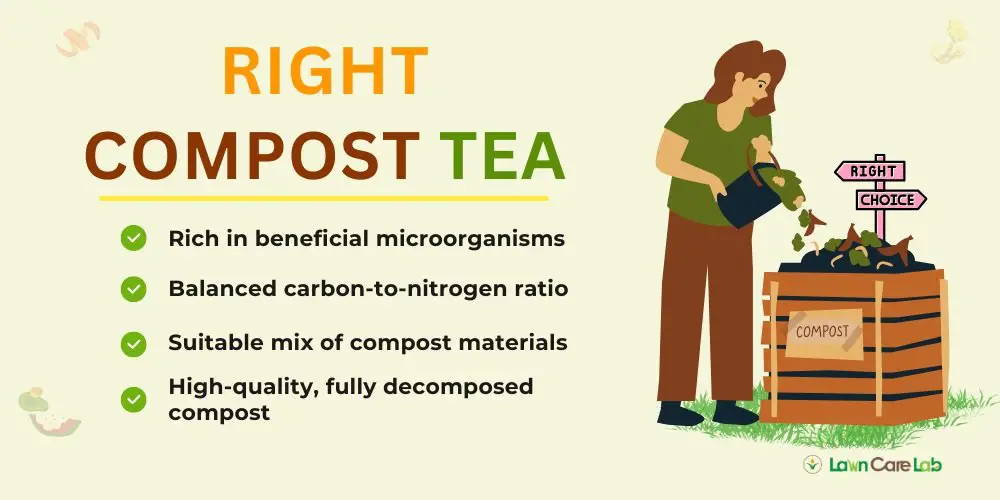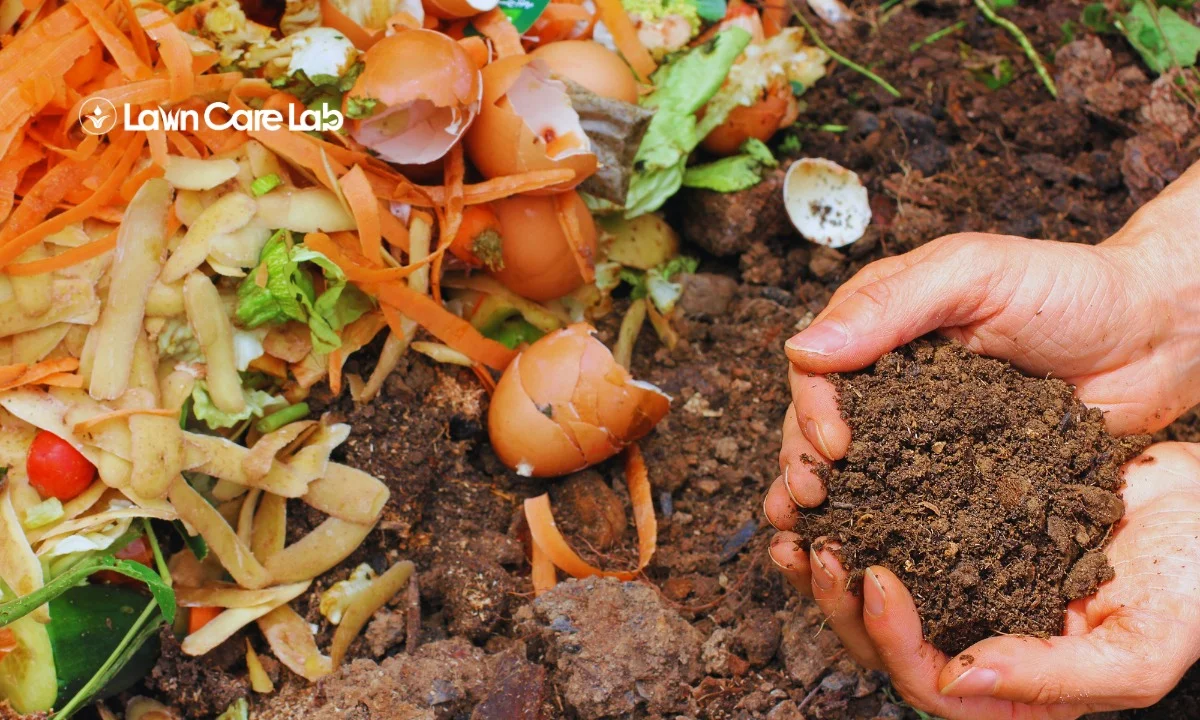A healthy lawn requires more than just sunlight and water—it depends on the vitality of the soil beneath it. One of the most effective ways to enhance soil health and boost lawn growth is by using compost tea.
This natural, nutrient-rich liquid fosters the development of beneficial microorganisms, which improve soil structure and fertility, making essential nutrients more available to your grass. In contrast to synthetic fertilizers, compost tea works in harmony with nature, reducing the need for chemical interventions by supporting a balanced ecosystem.
In this guide, we’ll explore how to brew and apply compost tea, the benefits it brings to your lawn, and best practices for achieving optimal results.
Whether you’re aiming to improve your lawn’s resilience against pests and diseases or simply want greener, healthier grass, compost tea offers a simple and eco-friendly solution.
Table of Contents
Benefits of Compost Tea
Compost tea is a powerful tool for a healthy lawn. It helps microbes grow and thrive in the soil. These microbes break down organic matter, making nutrients available to the lawn. This leads to stronger roots, healthier foliage, and a lawn that’s more resistant to disease and pests.

It works by adding beneficial microbes to the soil. These microbes outcompete pathogens, creating a balanced ecosystem, which is key to a healthy lawn. When microbes are thriving, the lawn needs fewer synthetic fertilizers and pesticides.
By using it, you create an ideal environment for your lawn to grow. The microbes help to improve soil structure and fertility. This means the lawn gets the nutrients it needs to stay healthy and strong.
Compost tea is a simple and effective way to promote a healthy lawn.
Choosing the Right Compost

Selecting the right compost is essential for brewing compost tea that supports lawn growth. The compost should be rich in beneficial microorganisms, with a balanced mix of organic matter such as leaves, grass clippings, and vegetable scraps.
Carbon-to-Nitrogen Ratio
Achieving the right carbon-to-nitrogen balance is important. Aim for a combination of “green” materials (like food scraps) and “brown” materials (like dried leaves). The compost should have moisture levels similar to a damp sponge, which promotes microbial activity essential for healthy soil.
A well-balanced compost provides the nutrients your lawn needs and fosters the growth of beneficial microbes. If the compost is too dry, too wet, or dominated by one material type, it won’t support the right balance of microorganisms or deliver the nutrients your lawn requires.
Compost Material Selection
Different compost types—such as worm castings, leaf mold, and food waste compost—offer distinct nutrient profiles. For a balanced compost tea, combine nitrogen-rich “green” materials (e.g., grass clippings, food waste) with carbon-rich “brown” materials (e.g., leaves, straw). This blend ensures your lawn gets a broad spectrum of nutrients.
For instance, worm castings are high in nitrogen, while leaf mold provides more carbon. A mixture of both creates a balanced compost tea that promotes healthy microbial activity, helping your lawn resist disease, improve growth, and avoid nutrient deficiencies.
Consider your lawn’s specific needs when choosing compost materials. If nitrogen is lacking, opt for a nitrogen-rich compost like food waste. For more carbon, use leaf mold.
Compost Quality Factors
The quality of compost is crucial for effective compost tea. Look for dark, crumbly compost that has an earthy aroma—signs that it is fully decomposed and ready to support microbial life.
Diverse microbial populations in the compost are also key to soil health. Choose compost that has been tested for microbial diversity, as different microbes play unique roles in maintaining a balanced soil ecosystem. Check for a guaranteed analysis of microbial content to ensure you’re using a compost that will create nutrient-rich compost tea, fostering a healthy lawn.
By selecting high-quality compost with the right texture and microbial diversity, you’ll brew a compost tea rich in nutrients and beneficial microbes, supporting both soil and plant health.
Making Compost Tea
Compost tea is simple to make and requires minimal tools. Start with a compost tea brewer or a large bucket with a mesh bag.
Fill the bag with 1-2 cups of mature compost and submerge it in 5-10 gallons of water. Let the mixture sit in a cool, shaded area for 24-48 hours, stirring occasionally to release nutrients from the compost into the water. Keep the water temperature between 50-70°F (10-21°C), promoting beneficial microorganisms’ growth.
To prevent the mixture from worsening, ensure the water is well-aerated throughout the process. After 24-48 hours, remove the compost and discard it. The resulting tea is now ready to be used on your lawn.
Using a good compost tea brewer, like those offered by Vivosun or Worm Factory 360, ensures proper airflow and easy cleaning, helping you make high-quality compost tea.
Application Methods and Rates
To maximize the benefits of compost tea, it’s crucial to apply it correctly based on your lawn’s specific needs, considering factors such as soil type, grass species, and climate. Compost tea encourages beneficial microbial activity, which promotes overall lawn health and growth.
For large lawns, sprayers or injectors are ideal because they provide even coverage. A sprayer with a wide fan tip is especially effective for distributing the tea evenly while minimizing drift and runoff. In smaller areas, a watering can or spray bottle works well. Before applying the compost tea, lightly water your lawn to help the tea penetrate the soil.
The general recommended dosage is 5-10 gallons per acre, but this may vary based on your lawn’s condition. Start with a smaller amount and adjust as needed to boost microbial activity without overwhelming the grass. The goal is to stimulate microbial growth in the soil, enhancing nutrient uptake and overall lawn resilience.
When applying compost tea, timing is also essential. Apply it during cooler parts of the day, such as early morning or evening, to reduce evaporation and allow better soil absorption. Avoid application in windy conditions or before heavy rainfall, as these factors can reduce the tea’s effectiveness.
For targeted application, a soil injection system or a soaker hose can deliver the tea directly to the roots, where it is most beneficial. A soaker hose with a flow rate of 1-2 gallons per minute is ideal for ensuring the correct application rate. This method improves nutrient uptake and fosters a healthier, more fertile lawn.
By using the right method and application rate, you can ensure your lawn gets the most from compost tea, promoting strong, sustainable growth.
Compost Tea Dosage Rates
Applying the right amount of compost tea is critical to your lawn’s health. Too little may not have an effect, while too much can cause harm. A standard guideline is to apply 1-2 gallons of compost tea per 1,000 square feet of lawn.
The method of application also affects dosage. For foliar sprays, dilute the compost tea to prevent burning your lawn. Different methods, like soil drenching or irrigation injection, may have specific rates, so always follow instructions for the best results.
Store compost tea in a shaded area and use it within 24-48 hours to maintain its microbial potency. Following recommended dosage rates ensures your lawn receives the full benefits of compost tea without risk of damage.
Timing and Frequency
Timing plays a key role in the effectiveness of compost tea. Apply it during cooler parts of the day, such as early morning or late evening, to reduce evaporation and ensure absorption. For best results, use compost tea every 1-2 weeks during the growing season. In periods of drought or extreme heat, reduce frequency to avoid stressing your lawn.
Avoid applying compost tea during heavy rain, as excess water can cause nutrients to leach from the soil. Adjust your schedule based on weather conditions to maximize the benefits.
Best Time to Apply
Applying compost tea at the right time is important for lawn growth. This is because it helps beneficial microorganisms establish themselves in the soil. To get the best results, consider the time of year and weather conditions.
In the growing season, apply compost tea when the lawn is actively growing. This is usually in spring and fall. Avoid applying it during extreme weather, like intense heat or drought. This can stress the lawn and make it harder for microorganisms to establish themselves.
If you live in an area with heavy rainfall, apply compost tea after the rain has stopped. This helps prevent nutrient leaching, which can reduce the effectiveness of the compost tea.
Monitoring and Maintenance Tips
To keep your lawn healthy after applying compost tea, check on it every few days. This ensures the treatment is working correctly.

It’s essential to monitor pH levels to keep them between 6.0 and 7.0, which is ideal for healthy microbial activity. You should also track nutrient balance to avoid over-fertilizing.
Within a week, you should see improvements in soil structure and fertility. As you continue applying compost tea, adjust how often you use it based on your lawn’s response.
If you notice any negative effects, stop using it and reassess the treatment. Regular monitoring helps you make informed decisions about your lawn care routine, keeping your lawn healthy and thriving.
Keep accurate records to refine your approach over time.
You can use a soil test kit to monitor pH levels and nutrient balance. These kits are available at most gardening stores and online.
It’s also a good idea to keep a lawn care journal to track your progress and note any changes. This will help you identify what’s working and what’s not so you can adjust your routine accordingly.
Conclusion
Using compost tea on your lawn requires patience and consistency. Applying compost tea regularly and checking the soil helps create a healthy balance between tiny microorganisms and the soil. This balance is important for your lawn’s health because it allows these microorganisms to break down nutrients and make them available to the grass.
As a result, your lawn gets the necessary nutrients to grow well. This process is similar to a farmhand taking care of their land to get the best results.
To get the most out of compost tea, focus on creating a healthy relationship between the microorganisms and the soil. Monitor the soil conditions and adjust the compost tea application as needed. This way, you can keep your lawn healthy and strong.
FAQs
Can Compost Tea Be Used on Newly Seeded Lawns?
Is Compost Tea Safe for Lawns With Pets and Children?
Can Compost Tea Be Used in Conjunction With Fertilizers?
How Long Does Compost Tea Remain Effective After Application?
Can Compost Tea Be Used to Control Lawn Pests and Diseases?
- How to Create a Lawn Care Schedule for Southern Climates - October 30, 2024
- How to Use Compost Tea to Boost Lawn Growth and Soil Health - October 23, 2024
- The Best Grasses for Saltwater-Exposed Lawns: Coastal Lawn Care - October 17, 2024



